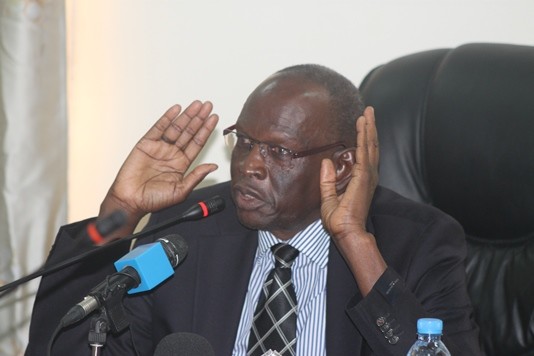Ex-South Sudan bank governor welcomes dismissal, pledges readiness to work with successor

Kornelio Koryom Mayik, former governor of central bank of South Sudan has welcomed his dismissal from his position and pledged to work together with his successor and the new team.
“This is a normal practice. It is the prerogative of the president to appoint and relieve. So there is no problem with that. I welcome it and congratulate my replacement for winning the trust of the president to serve the nation in this capacity”, said Koryom when asked how he feels on Tuesday.
He pledged readiness to work with his replacement should he and his team requires his support.
“I am profoundly grateful to the President of the republic and his government for the opportunity he gave me to serve the people of this country. It was an honour and privilege to serve the people of South Sudan in the capacity of the governor of central bank”, said Koryom.
The former official was reacting to decision of President Kiir sacking him from his position as the central bank governor amid rising inflation and a broke government ravaged by conflict.
Kiir replaced him with Othom Rago Ajak as the governor of the Bank of South Sudan (BSS), who served in the past as head of foreign exchange department before he was removed in 2011 from the office.
The president gave no reason for firing Koryom, a close relative to his wife. The changes came after speculations and rumours claimed the president was becoming impatient with the team at the central bank for failing to rein in high inflation and depreciation of the South Sudanese Pound (SSP) against the dollar after devaluing the currency, abandoning the fixed exchange rate for the black market one in December 2015.
Kiir also sacked Koryom’s deputy John Dor Majok, deputy Finance minister Mary Jervas Yak, and Salvatore Garang, the first undersecretary of the Ministry of Finance and Economic Planning.
Conflict-hit country plunged into economic crunch following eruption of civil war in 2013 between supporters of President Kiir and his former deputy Riek Machar.
The conflict has drained the oil-rich country of much-needed revenue generated from oil production, leaving the country’s ailing economy on the verge of collapse as inflation reached 800 per cent in January. A peace deal signed in August 2015 led to the formation of a transitional unity government in last April, but was shattered by renewed fighting in July 2016.
Humanitarian organizations say tens of thousands of South Sudanese have been killed, over two million displaced and another 4.6 million left severely food insecure since December 2013